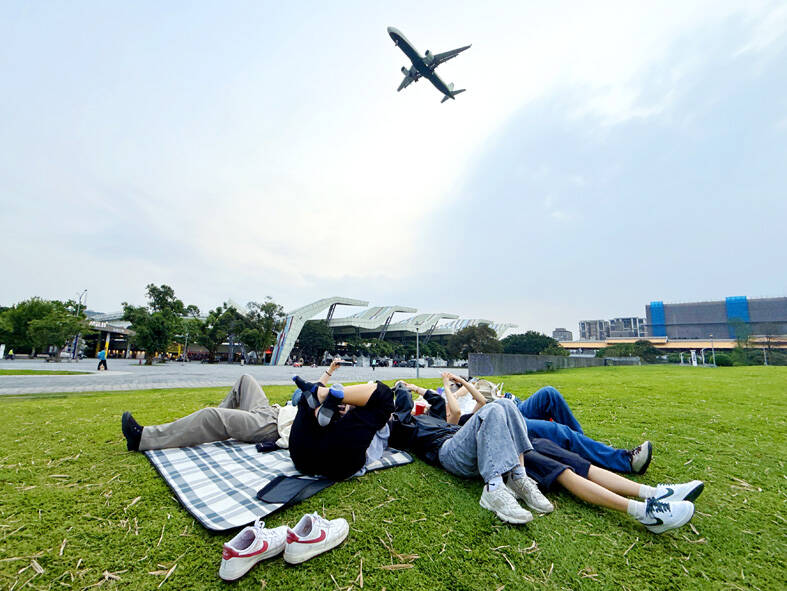High temperatures would be added to the list of “hazardous weather” if amendments to the Meteorological Act (氣象法) proposed by the Central Weather Administration (CWA) are promulgated.
Article 2 of the act defines hazardous weather as “weather phenomena which may cause loss of life and property such as typhoon, heavy rain, torrential rain, thunder and lightning, hail, dense fog, tornado, high wind, low temperature, foehn [wind], drought, etc.”
When such conditions arise, the agency is authorized to issue warnings and special advisories.

Photo: CNA
CWA Administrator Lu Kuo-chen (呂國臣) told the Central News Agency in an interview that the agency is considering adding high temperatures to the list due to the rise in frequency of their occurrence.
The amendments would allow the CWA to issue special advisories when the mercury rises markedly, which would help local government officials and disaster relief agencies to respond appropriately, Lu said.
The CWA plans to send the proposal to the Executive Yuan for further deliberation this year, he said.
The agency is still deliberating the conditions to be met before a special advisory for high temperatures would be issued and whether it would continue its high temperature warning system, he added.
The CWA’s current system has run since June 15, 2018, with alerts issued when ground-level temperatures reach 36°C.
A “yellow” warning means temperatures would reach 36°C, “orange” means they would be at least 36°C for three days or more and “red” means temperatures would be at least 38°C for three days or more.

The Coast Guard Administration (CGA) yesterday said it had deployed patrol vessels to expel a China Coast Guard ship and a Chinese fishing boat near Pratas Island (Dongsha Island, 東沙群島) in the South China Sea. The China Coast Guard vessel was 28 nautical miles (52km) northeast of Pratas at 6:15am on Thursday, approaching the island’s restricted waters, which extend 24 nautical miles from its shoreline, the CGA’s Dongsha-Nansha Branch said in a statement. The Tainan, a 2,000-tonne cutter, was deployed by the CGA to shadow the Chinese ship, which left the area at 2:39pm on Friday, the statement said. At 6:31pm on Friday,

The Chinese People’s Liberation Army Navy’s (PLAN) third aircraft carrier, the Fujian, would pose a steep challenge to Taiwan’s ability to defend itself against a full-scale invasion, a defense expert said yesterday. Institute of National Defense and Security Research analyst Chieh Chung (揭仲) made the comment hours after the PLAN confirmed the carrier recently passed through the Taiwan Strait to conduct “scientific research tests and training missions” in the South China Sea. China has two carriers in operation — the Liaoning and the Shandong — with the Fujian undergoing sea trials. Although the PLAN needs time to train the Fujian’s air wing and

The American Institute in Taiwan (AIT) put Taiwan in danger, Ma Ying-jeou Foundation director Hsiao Hsu-tsen (蕭旭岑) said yesterday, hours after the de facto US embassy said that Beijing had misinterpreted World War II-era documents to isolate Taiwan. The AIT’s comments harmed the Republic of China’s (ROC) national interests and contradicted a part of the “six assurances” stipulating that the US would not change its official position on Taiwan’s sovereignty, Hsiao said. The “six assurances,” which were given by then-US president Ronald Reagan to Taiwan in 1982, say that Washington would not set a date for ending arm sales to Taiwan, consult

A Taiwanese academic yesterday said that Chinese Ambassador to Denmark Wang Xuefeng (王雪峰) disrespected Denmark and Japan when he earlier this year allegedly asked Japan’s embassy to make Taiwan’s representatives leave an event in Copenhagen. The Danish-language Berlingske on Sunday reported the incident in an article with the headline “The emperor’s birthday ended in drama in Copenhagen: More conflict may be on the way between Denmark and China.” It said that on Feb. 26, the Japanese embassy in Denmark held an event for Japanese Emperor Naruhito’s birthday, with about 200 guests in attendance, including representatives from Taiwan. After addressing the Japanese hosts, Wang